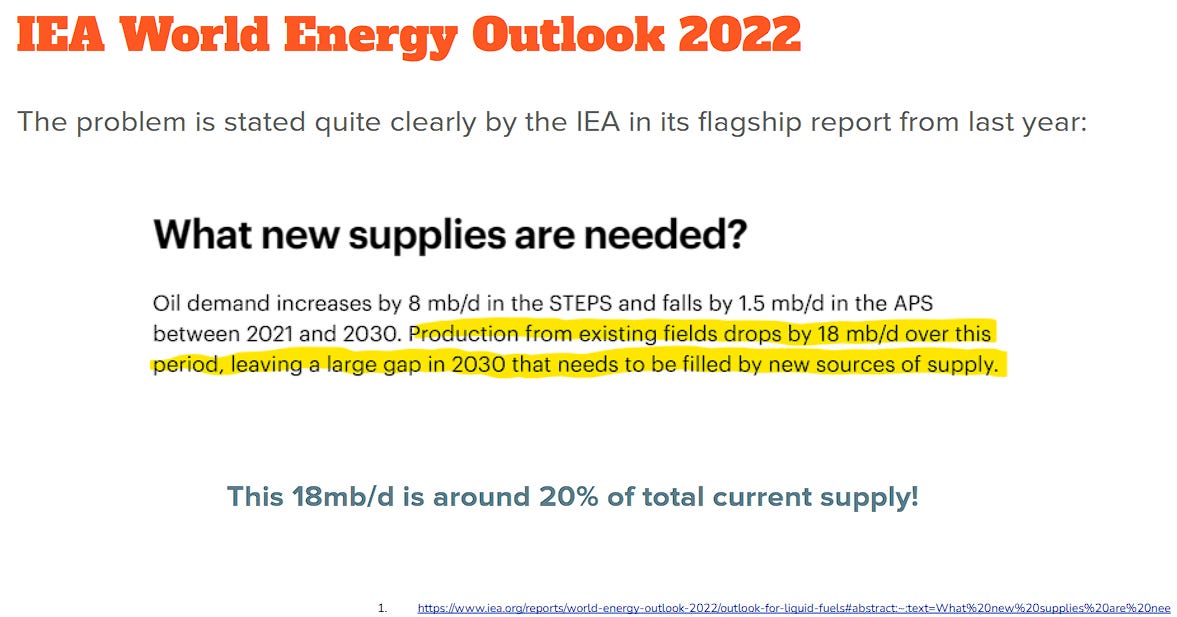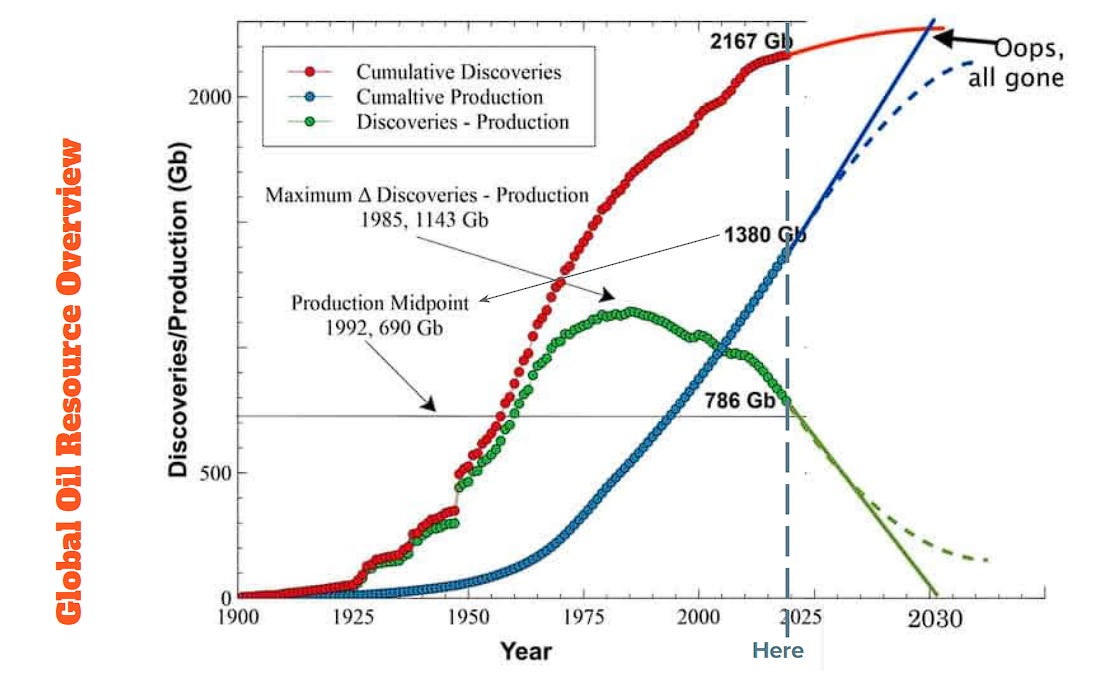Introduction
Thank you, Environment Select Committee, for the opportunity to submit on the Fast-track Approvals Bill. As a professional deeply committed to energy literate strategic decision making, I vehemently oppose what I see as not a legal framework for process efficiency, but a licence for ecological havoc — all in the name of economic growth. Yes, we could probably increase GDP with the proposed approach, at least temporarily, but the long term impacts of crony capitalism of this nature are abhorrent and indefensible.
It will clearly accelerate the depletion of resources that we must instead eke out in support of a soft landing as our global industrial economy runs into a series of hard resource supply limits in the coming years.
Our planet, and specifically Aotearoa, cannot sustain such reckless acceleration whilst the twin headwinds of (what now appears to be runaway - Appendix 1) climate change and fossil energy resource depletion (specifically oil - Appendix 2) guarantee that we’re simply going further down a dead end track to nothing less than civilisational collapse.
The following slides are excerpts from this presentation I gave to the Engineering NZ ‘Climate Conversations’ talk series: https://bit.ly/NS_NETEN
The total resource as above is but one part of the story, and arguably not the most important part. It’s the rate of supply that really matters, and that will be constrained as energy costs increase as the ‘net energy’ declines:
The current evidence of this situation is that the oil price oscillates within a tightening band, and it’s clear that this can’t go on once the trend lines cross:
Why I Oppose This Bill
Resource Shortsightedness:
The Bill dismisses the pressing reality of our dwindling natural resources—most critically, oil. As global oil reserves shrink, this Bill’s aggressive push for economic development threatens to exacerbate and reinforce our already dangerous reliance on fossil fuels.
Unsustainable Projects:
Endorsing projects like coal mines and oil drilling, and allowing them to bypass regulatory safeguards contradicts every principle of strategic development in the 21st century, and ignores the irreversible damage these projects inflict on biodiversity and ecosystem health. As oil and other critical resources dwindle, we must take hard decisions now to wean society off these seemingly essential inputs to our economy.
Unchecked Government Power:
The power this Bill grants to three ministers to approve environmentally damaging projects without comprehensive oversight is a direct path to policy-driven ecological disaster.
Environment and Democracy in the Backseat:
By removing public consultation, this Bill not only undermines democratic processes but also silences the voices of those most affected by its outcomes, bypassing societal concerns and environmental safeguards.
Irresponsible Exploitation Under the Guise of Progress
The Bill prioritises economic gains from natural resource exploitation with no regard to the wider (and extremely severe) implications of hitting resource limits, particularly oil; the lifeblood of our industrial economy.
By ignoring the finite nature of these resources, it sets us on an accelerated collision course with a reality where energy scarcity and ecological degradation constrain future generations more drastically than ever.
We should ethically choose a path of tough decisions now, supporting a strategic reduction in total energy and resource throughput (‘degrowth’), consistent with the resource limits I have identified. This is much preferable to the Fat Cat Approvals Bill which is akin to flooring the gas with alarmingly little fuel, and a cliff fast approaching.
The proposed fast-track process sidesteps critical environmental safeguards, pushing us further from meeting international climate commitments. Far from increasing export potential, this will actively curb export potential, as ESG and environmental performance legislation in key export markets leaves us behind.
In Conclusion
This Bill should not pass. It’s a dangerous acceleration towards the edge of our planet’s ecological and resource limits. Rather, we urgently need a thorough, informed and democratic reassessment of the Fast-track approvals process and rampant Parliamentary use of ‘Urgency’, alongside a broader, informed public debate on upcoming constraints on resource management and energy consumption.
Appendix 1 - run-away climate change?
Despite recent attempts to use climate science to drive policy, the reality of probable run-away climate change, and the implications to BAU and attempts to continue industry led growth in the face of increasingly severe climate related disruptions, which are already well beyond the scenarios in the IPCC reports, and Climate Commission advice, infrastructure design standards.
The climate crisis is becoming increasingly dire, as recent data and expert analysis suggest that global temperatures are nearing critical thresholds set by the Paris Agreement. The Agreement aims to keep global temperature rise well below 2°C above pre-industrial levels, with a more stringent target of 1.5°C. However, 2023 saw the 12-month rolling average global air temperature exceed 1.5°C above the 1880-1920 baseline, with predictions for 2024 suggesting an increase to between 1.6°C and 1.7°C. Notably, in November 2023, daily global temperature anomalies briefly surpassed the 2°C mark.
Educational resources and further readings are:
Climate Reality Check - a 2020 report on 20 critical points.
Climate Uncensored: Telling it as it is - expert analysis of climate science without political or media/advertiser bias.
Energy and Human Ambitions on a Finite Planet - open source textbook from Prof Tom Murphy, UC San Diego. “This book is written to support a general education college course on energy and the environment. It was formulated as a physics course, but is written in the hope that it may also be accessible beyond this narrow setting. Physics is built on a mathematical foundation, and the domain of energy demands quantitative assessment. As a consequence, the book does not shy away from numbers. The math that is covered is presented in a way that aims to integrate intuition and the formality of equations.”
Reality Blind - Vol. 1 - open access textbook on the polycrisis, and ‘integrating the systems science underpinning our collective futures’.
Appendix 2 - fossil energy resource depletion - specifically oil:
The three articles summarised below detail the challenges that the oil industry and broader economy face due to the depletion of oil resources and the increasing energy required to extract what remains. Here's a summary of the key points in each document:
1. "Bye-Bye Carbon" : This article discusses the reality that conventional oil production peaked in November 2018, with only less efficient sources like natural gas liquids supplementing this decline. It emphasises the increasing energy and material costs of drilling, describing these as a growing logistical burden that is unsustainable.
2. "Meet The Gator: Growing Energy Demand": Here, the focus is on the 'alligator'—a metaphor for the rising energy demands of oil extraction—which threatens to cap off the net energy returned to the economy, thus stunting growth. The interdependence of all modern energy production methods on oil, particularly diesel, is highlighted as a critical vulnerability. It underscores that the EROEI (Energy Returned on Energy Invested) is declining as new sources like shale and tar sands come with poorer returns and greater environmental damage.
3. "Dodging The Gator - What Can Be Done?": This piece explores potential responses to the inevitable decline in net energy availability. It argues that no amount of technological innovation can outpace the fundamental geophysical limits we are reaching. The piece is critical of simplistic survival strategies and suggests that the true challenge is a comprehensive transformation of how societies operate in light of these limits. It also points to major geopolitical and environmental risks, including nuclear war, as potential accelerators of decline.
Together, these articles paint a picture of a civilization at a critical juncture due to the unsustainable exploitation of oil resources. They call for profound economic and societal shifts to manage the impending long-term decline in available energy and the associated challenges. The overarching message is clear: the era of easy oil is over, and a new approach is urgently needed to navigate the future.












Another brilliant post Nathan
Woohoo, very happy to have found you here!